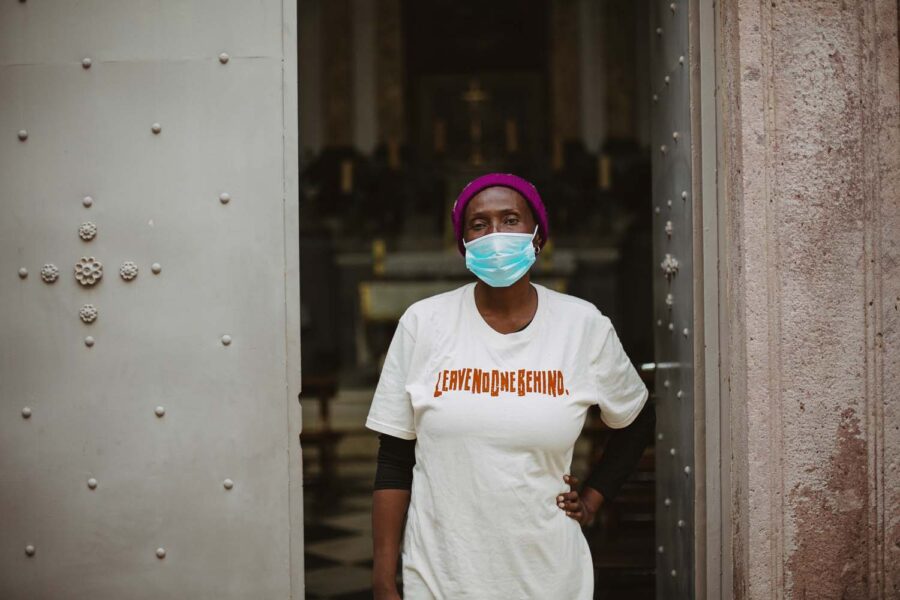Every Saturday, Cecile* heads to the Catholic Church of Lesvos from the temporary Reception and Identification Centre (RIC) in Mavrovouni where she resides, to help distribute food and assist other refugees who want to attend the service.
What is more, she is daily occupied at one of the COVID-19 information desks that have been set up inside the temporary RIC, where she distributes protective masks to the refugee community, urges them to regularly wash and disinfect their hands and encourages them to follow the personal hygiene measures to protect against COVID-19.
When Cecile describes her volunteering activities, the tone of her voice becomes happier. She feels a valued member of the community and forgets about the traumatic events she has experienced.
Cecile was born and raised in the Democratic Republic of Congo (DRC). Having lost her parents at an early age, she grew up with her aunt. Living with her aunt was not easy; she had to do all of the housework and was not allowed to attend school.
Cecile had a relationship and fell pregnant. Her aunt then forced her to marry a much older man, who already had three more wives, so as to raise her daughter with him. “I suffered a lot”, she says, recalling that period.
A devastating blow occurred when Cecile’s daughter died suddenly of an illness at the age of 18. Cecile had to manage not only her loss but also the threats from her daughter’s father. He had become a high-ranking official by that time, and taking advantage of his position, he blamed her for the child’s death and threatened to convict her.
This forced Cecile to urgently flee the country. “I didn’t have anyone to support me. This is why I had to escape from the country and didn’t even see where my child was buried”, she says.
Cecile’s journey to find safety was very difficult. She was sexually exploited in her effort to leave the country. When she finally reached Turkey, she found herself alone and homeless and was sexually assaulted during her five-month stay.
“Ever since I was born, everything that happens to me is difficult. I haven’t seen an easy and beautiful life so far. I haven’t been happy”, Cecile says and her face fills with despair. The adversities she has encountered are clearly etched on her face.
She arrived in Lesvos in October 2019 and applied for asylum. Since then, she has been staying at the island’s RIC, initially in Moria and now in Mavrovouni. As a survivor of gender-based violence (GBV), Cecile receives psychosocial support from a psychologist and a social worker from the non-profit Centre of Research on Women’s Issues “Diotima”.
Diotima Centre, in cooperation with UNHCR and with financial support from the European Union, offers comprehensive support services to refugee survivors of GBV. Survivors may have experienced GBV at any stage of their lives – in their countries of origin, during their journey, or after their arrival in Greece.
Through a holistic program, Diotima Centre assists by providing support, including case management, free legal aid, psychosocial support, referrals to specialized agencies and services, emergency housing, as well as prevention and awareness-raising events for the broader population.
Thanks to Diotima Centre’s support, Cecile was recently able to hold a memorial service for her deceased daughter, which she says helped to alleviate much of her pain.
The psychologist who supports her explains that the memorial service was liberating for Cecile. It helped her to experience and express her grief, something she was not able to do in her home country or during her journey.
In October 2021, Diotima Centre began operating the “Women Info Point” located near the Mavrovouni RIC, as part of the same program.
The Info Point hosts women’s empowerment groups, as well as information and prevention sessions around GBV issues.
Cecile’s utmost need, as an asylum-seeker, is to feel secure, a feeling that she did not have in her hometown. Her dream is to move on from the RIC, live in a house, have a partner, find a job, and live “a normal life, like other people”, she says.
This sense of normality is what asylum-seekers and refugees who visit the Catholic Church of Lesvos are searching for. “Asylum-seekers participate in the services, they read, they help us with the liturgy and the prayers.
This gives people a sense of dignity, that they are able to do something, to contribute somehow to the church and to their community”, says Len Meachim, the Subdeacon of the Catholic Church.
He highlights how much Cecile has changed since he first saw her. “When I first met her, she seemed very sad, but little by little a smile appeared on her face”.
He explains to Cecile the importance of a typical Greek wish: “May you live to remember those who passed away”, urging her to live again. “And I think that is exactly what she is doing now” he says.
*Name has been changed for protection reasons





